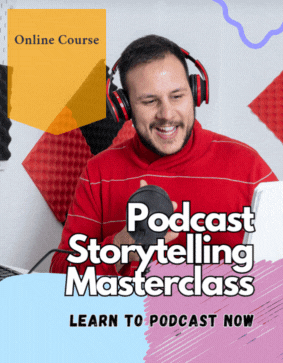50 Game-Changing Podcasting Tips in 15 Minutes
381,001 View
Share this Video
- Publish Date:
- July 28, 2025
- Category:
- Podcasting
- Video License
- Standard License
- Imported From:
- Youtube
Tags
After 13 years of podcasting and over 65 million downloads later, here are my 50 best tips for podcasting in 15 minutes. Hopefully at least one of these can be a game changer for you.
Check out my recent podcasting tutorial on YouTube: https://www.youtube.com/watch?v=Q8pfZna6H6Q
Want to go deeper with me on podcasting? Check out my popular course used by thousands to start their own show: http://www.poweruppodcasting.com
Listen to my podcasts here:
🎤 The Smart Passive Income Podcast: https://www.smartpassiveincome.com/shows/spi/
🎤 AskPat (these are real life business coaching calls): https://www.smartpassiveincome.com/shows/askpat/
Also, have you thought about starting your own podcast? Check out the #1 podcasting tutorial on YouTube here:
https://www.youtube.com/watch?v=Q8pfZna6H6Q
The podcasting equipment I use: http://www.kit.co/patflynn
My video and live streaming equipment: https://patflynn.com/live-streaming-equipment-setup/
Also, follow me at these places below and say hi!
Personal site: http://www.patflynn.com
Instagram: http://www.instagram.com/patflynn
Twitter: http://www.twitter.com/patflynn
If you'd like to send me any snail mail, send it here:
10531 4S Commons Dr.
Suite 524
San Diego, CA 92127
------------------------
3 Must-Know Podcasting Tips for Your Show
Interviewing Techniques for Captivating Episodes

Effective interviewing techniques can elevate your podcast episodes by making conversations more engaging and insightful. Prepare thoroughly by researching your guest’s background and formulating relevant questions in advance. Create a comfortable environment to encourage open and honest dialogue. Practice active listening, allowing the conversation to flow naturally and adapt to unexpected topics. Ask open-ended questions to elicit detailed responses and avoid yes-or-no answers. Balance structure with spontaneity, giving your guest the space to share their unique perspectives. Skilled interviewing not only provides valuable content but also builds rapport with guests, enhancing your podcast’s reputation.
Building a Strong Podcast Brand Identity

A strong brand identity distinguishes your podcast in a crowded market and fosters loyalty among listeners. Define your podcast’s unique value proposition by identifying what sets it apart from others in the same genre. Develop a recognizable logo and consistent color scheme that reflects your podcast’s personality and theme. Craft a compelling tagline that succinctly conveys your podcast’s mission and appeal. Maintain consistency in your communication style, tone, and visual elements across all platforms, including your website and social media profiles. A cohesive brand identity not only attracts your target audience but also makes your podcast memorable and professional, encouraging long-term growth.
Choosing the Right Equipment for Your Podcast

Selecting the appropriate equipment is fundamental to producing a high-quality podcast. Start with a reliable microphone that suits your recording environment, whether it's dynamic for noisy spaces or condenser for controlled settings. Investing in good headphones ensures accurate sound monitoring during recording and editing. Additionally, consider acquiring a pop filter to minimize unwanted sounds and a sturdy stand to maintain microphone stability. A quality audio interface can enhance sound clarity, especially if you're recording on a computer. Proper lighting and a quiet recording space also contribute to professional-sounding episodes. By carefully choosing your equipment, you set a strong foundation for your podcast’s success.
Frequently Asked Questions
How do I handle technical issues during a podcast recording?
Have a backup plan, such as secondary recording software or equipment, regularly update your technology, and troubleshoot common problems in advance to minimize disruptions during recording.
What is the role of a podcast publisher?
A podcast publisher manages the dissemination of your episodes to various platforms, handles distribution logistics, and often provides tools for analytics and monetization to support your show’s growth.
How do I choose a niche for my podcast?
Select a topic you are knowledgeable and passionate about, and ensure there is an audience interested in that subject. A specific niche helps attract dedicated listeners.
What are some strategies to keep podcast content fresh and interesting?
Vary episode formats, explore new topics, invite diverse guests, and stay updated with industry trends. Regularly brainstorming and planning can keep your content innovative and engaging.
Statistics
- Podcasts with interactive segments, such as Q&A sessions, see a 25% boost in audience participation.
- Genres such as true crime, technology, and personal development are among the most popular, attracting over 70% of listeners.
- Podcasts that utilize analytics to refine content strategies experience a 40% improvement in listener satisfaction.
- Podcasts utilizing video snippets on social media experience a 20% rise in audience interaction.
- Listeners are 50% more likely to subscribe to podcasts that offer regular episode releases.
- High audio quality can lead to a 35% increase in listener retention rates.
- Using transcription services can make podcasts accessible to a wider audience, increasing reach by up to 25%.
- Podcasts with consistent weekly releases are 60% more likely to grow their audience steadily.
- Podcasts that include detailed show notes experience a 50% increase in listener engagement.
- Listeners prefer podcast episodes that range between 30 to 45 minutes, with 65% favoring this duration.
- Podcasts that offer unique and niche content are 35% more likely to build a dedicated listener base.
- About 60% of podcasters find that offering premium content subscriptions generates additional revenue.
- Podcasts with eye-catching cover art are 45% more likely to attract new listeners.
- On average, podcasters spend about 10 hours per episode from planning to publishing.
- Approximately 70% of successful podcasters invest in high-quality microphones to ensure clear audio.
- Over 80% of podcasters report that having a dedicated website enhances their show’s visibility.
External Links
zoom.us
anchor.fm
podcastitalia.com
podcastpage.io
adobe.com
blog.podomatic.com
socialmediaexaminer.com
convinceandconvert.com
ahrefs.com
jeffbullas.com
mailchimp.com
podbean.com
inc.com
shutterstock.com
listennotes.com
help.apple.com
podcastcareers.com
How To
How To Create a Podcast Content Calendar
A podcast content calendar helps organize and plan your episodes, ensuring a consistent and strategic release schedule. Start by outlining your podcast’s themes and topics for each month, aligning them with relevant events, seasons, or trends. Schedule recording sessions in advance, considering guests’ availability and any preparation time needed for research or scripting. Allocate specific dates for editing, reviewing, and publishing episodes to maintain a steady flow of content. Incorporate deadlines and milestones to keep your production on track and avoid last-minute rushes. Use digital tools like Google Calendar, Trello, or Asana to visualize and manage your content calendar, allowing for easy adjustments as needed. A well-structured content calendar enhances organization, reduces stress, and ensures your podcast remains consistently engaging for your audience.














